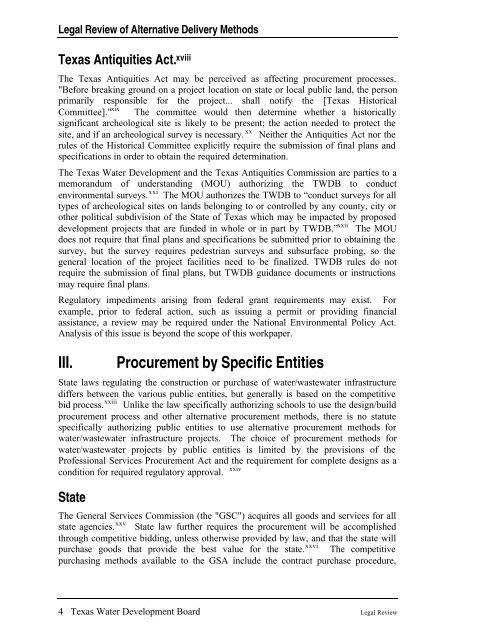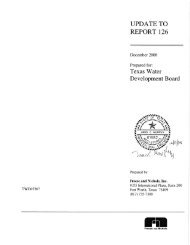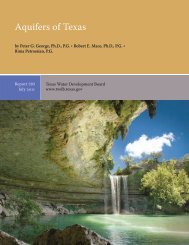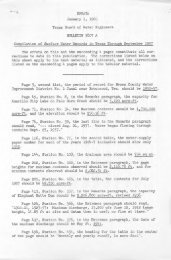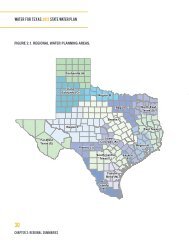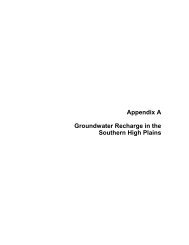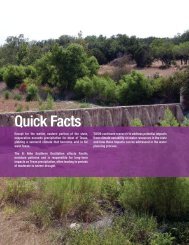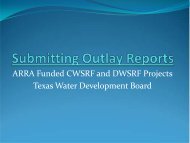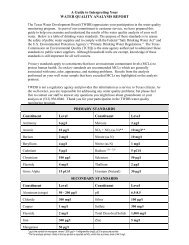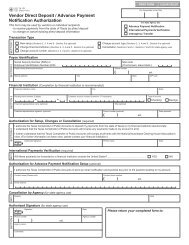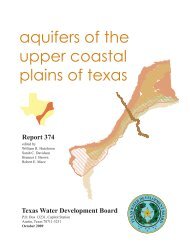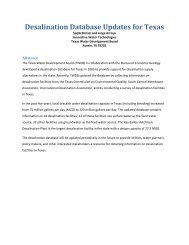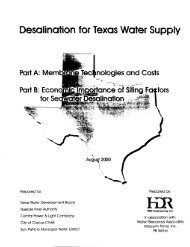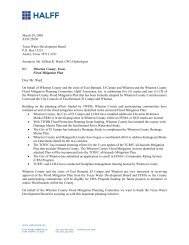Alternative Project Delivery - Texas Water Development Board
Alternative Project Delivery - Texas Water Development Board
Alternative Project Delivery - Texas Water Development Board
Create successful ePaper yourself
Turn your PDF publications into a flip-book with our unique Google optimized e-Paper software.
Legal Review of <strong>Alternative</strong> <strong>Delivery</strong> Methods<br />
<strong>Texas</strong> Antiquities Act. xviii<br />
The <strong>Texas</strong> Antiquities Act may be perceived as affecting procurement processes.<br />
"Before breaking ground on a project location on state or local public land, the person<br />
primarily responsible for the project... shall notify the [<strong>Texas</strong> Historical<br />
Committee]." xix The committee would then determine whether a historically<br />
significant archeological site is likely to be present; the action needed to protect the<br />
site, and if an archeological survey is necessary. xx Neither the Antiquities Act nor the<br />
rules of the Historical Committee explicitly require the submission of final plans and<br />
specifications in order to obtain the required determination.<br />
The <strong>Texas</strong> <strong>Water</strong> <strong>Development</strong> and the <strong>Texas</strong> Antiquities Commission are parties to a<br />
memorandum of understanding (MOU) authorizing the TWDB to conduct<br />
environmental surveys. xxi The MOU authorizes the TWDB to “conduct surveys for all<br />
types of archeological sites on lands belonging to or controlled by any county, city or<br />
other political subdivision of the State of <strong>Texas</strong> which may be impacted by proposed<br />
development projects that are funded in whole or in part by TWDB.” xxii The MOU<br />
does not require that final plans and specifications be submitted prior to obtaining the<br />
survey, but the survey requires pedestrian surveys and subsurface probing, so the<br />
general location of the project facilities need to be finalized. TWDB rules do not<br />
require the submission of final plans, but TWDB guidance documents or instructions<br />
may require final plans.<br />
Regulatory impediments arising from federal grant requirements may exist. For<br />
example, prior to federal action, such as issuing a permit or providing financial<br />
assistance, a review may be required under the National Environmental Policy Act.<br />
Analysis of this issue is beyond the scope of this workpaper.<br />
III.<br />
Procurement by Specific Entities<br />
State laws regulating the construction or purchase of water/wastewater infrastructure<br />
differs between the various public entities, but generally is based on the competitive<br />
bid process. xxiii Unlike the law specifically authorizing schools to use the design/build<br />
procurement process and other alternative procurement methods, there is no statute<br />
specifically authorizing public entities to use alternative procurement methods for<br />
water/wastewater infrastructure projects. The choice of procurement methods for<br />
water/wastewater projects by public entities is limited by the provisions of the<br />
Professional Services Procurement Act and the requirement for complete designs as a<br />
condition for required regulatory approval. xxiv<br />
State<br />
The General Services Commission (the "GSC") acquires all goods and services for all<br />
state agencies. xxv State law further requires the procurement will be accomplished<br />
through competitive bidding, unless otherwise provided by law, and that the state will<br />
purchase goods that provide the best value for the state. xxvi The competitive<br />
purchasing methods available to the GSA include the contract purchase procedure,<br />
4 <strong>Texas</strong> <strong>Water</strong> <strong>Development</strong> <strong>Board</strong> Legal Review


